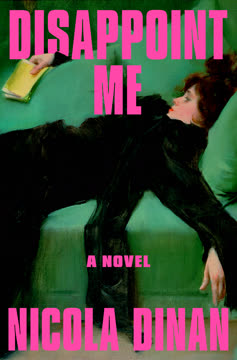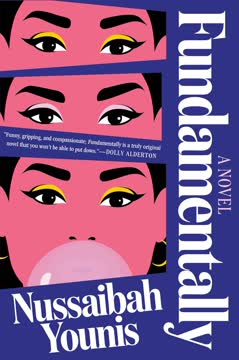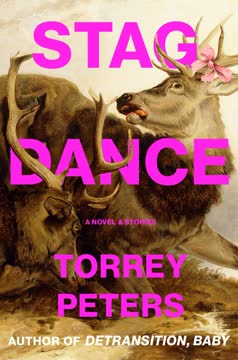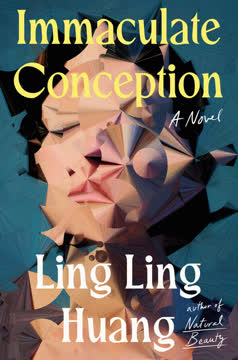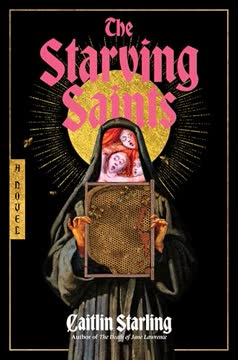Plot Summary
New Year's Disillusionment
At a raucous New Year's party, Max, a thirty-year-old trans woman and poet-turned-lawyer, floats through a haze of drugs, old friends, and the ache of recent heartbreak. She's surrounded by queer community, but feels the sting of jealousy, aging, and the sense that everyone else is moving on. A confrontation with Carla, a fellow trans woman, exposes Max's insecurities and the ways envy and self-doubt poison her sense of self. The night ends in disaster: Max falls down the stairs, waking up in a hospital, alone and forced to confront the emptiness at the core of her life.
Hospital Mornings and Friendship
Max wakes in the hospital, her body battered and her mind swirling with existential dread. The absence of family and the presence of her best friend Simone and Simone's girlfriend Eva highlight the fragility of chosen family. Over breakfast, the trio tiptoe around Max's pain, but the comfort of their routine—cooking, eating, bickering—offers a brief reprieve. Max's longing for connection, her fear of being left behind, and her ambivalence about writing and relationships all surface, setting the stage for her search for meaning and intimacy in the year ahead.
Dating App Disappointments
Determined to move forward, Max throws herself into dating, navigating the transactional world of apps and awkward first dates. She meets Vincent, a British-Chinese lawyer, whose pragmatic approach to life and work both attracts and unsettles her. Their first date is marked by cultural touchstones, shared histories, and the tentative hope of something real. Yet, beneath the surface, both are haunted by past relationships, family expectations, and the fear that intimacy is just another performance.
Vincent's Past Unveiled
The narrative shifts to Vincent's perspective, flashing back to his gap year in Thailand. Alone and anxious, Vincent befriends Alex, a trans woman preparing for surgery. Their connection is genuine but fraught with Vincent's internalized shame, cultural confusion, and the toxic influence of his friend Fred. A drunken, violent incident—Fred's assault on Alex after learning she is trans, with Vincent complicit in the revelation—casts a long shadow over Vincent's adulthood, shaping his guilt and his approach to love.
Building Something New
Back in the present, Max and Vincent's romance grows through shared meals, art, and the comfort of routine. They navigate the complexities of being queer, mixed-race, and trans in a world that prizes conformity. Family histories—Max's colonial Hong Kong upbringing, Vincent's filial obligations—intertwine with their present, as they try to build a life together. Yet, the specter of Vincent's past, Max's insecurities, and the ever-present threat of being "othered" linger.
Family, Shame, and Belonging
Max and Vincent each grapple with their families: Max with her parents' complicated pride and her brother Jamie's impending fatherhood; Vincent with his parents' expectations and his father's heart attack. The couple's attempts to integrate their lives are fraught with microaggressions, misunderstandings, and the pain of not being fully seen. Weddings, baby announcements, and family gatherings become battlegrounds for identity, acceptance, and the longing for unconditional love.
The Weight of the Body
As friends and family move into new life stages—marriage, parenthood—Max is forced to confront her own body's limitations. Questions of fertility, gender, and the right to family become urgent, especially in the face of casual cruelty and invasive curiosity from others. The couple's discussions about children, legacy, and what it means to be "enough" are tender and raw, exposing the fault lines in their relationship and the broader world.
Jealousy, Betrayal, and Violence
A trip to France with friends brings simmering tensions to a boil. Simone's career implodes in scandal, Aisha's marriage is tested by infidelity, and Fred's past violence against Alex is revealed. Vincent's role in outing Alex and abandoning her after surgery comes to light, shattering Max's trust. The group is forced to reckon with the ways shame, jealousy, and betrayal shape their lives, and whether forgiveness is possible—or even desirable.
Tumour: The Unwelcome Guest
Max is diagnosed with a brain tumour, likely caused by her hormone therapy. The news is both a shock and a strange relief, forcing her to confront mortality, regret, and the meaning of survival. As she prepares for surgery, the support and suffocation of friends and family become overwhelming. The tumour becomes a metaphor for all the disappointments, betrayals, and unresolved pain that have accumulated in her life.
Forgiveness and Its Limits
In the aftermath of revelations about Vincent and Fred, Max flees to her parents' home, seeking solace and clarity. Conversations with her father about forgiveness, accountability, and the impossibility of perfect justice offer no easy answers. The question of whether to forgive Vincent—whether it's even hers to give—haunts her, as does the knowledge that survival often means living with disappointment, not erasing it.
Weddings and What We Inherit
At Emily's wedding, Max and Simone are forced to perform femininity and friendship for an audience that doesn't fully see them. The rituals of marriage, family, and community are both comforting and alienating, highlighting what is gained and lost in the pursuit of acceptance. Max's longing for connection, her fear of being left behind, and her ambivalence about forgiveness all come to a head.
The Reckoning in France
The group's holiday in Provence becomes a crucible for confession and confrontation. Simone and Aisha clash over identity and tradition; Fred and Vincent's past with Alex is finally revealed, forcing everyone to confront the limits of forgiveness and the reality of harm. Max and Vincent's relationship is pushed to the brink, as the weight of the past threatens to crush any hope for the future.
The Aftermath of Truth
Max retreats to her parents' home, wrestling with the aftermath of betrayal and the approach of surgery. Conversations with her father about the fire that changed their family, and the nature of forgiveness, offer a measure of peace but no easy resolution. The possibility of returning to Vincent, of building something new from the wreckage, remains uncertain but not foreclosed.
The Shape of Survival
As Max undergoes surgery, the narrative narrows to the essentials: the body's fragility, the necessity of care, and the hope for a future that is not defined by disappointment. The epilogue, written in poetic fragments, gestures toward survival—not as triumph, but as the willingness to let others hold the bowl, to accept care, and to believe in the possibility of something more.
The Future, Promised and Disappointing
In the aftermath of everything—betrayal, illness, forgiveness—Max and Vincent are left with the task of living. The future is uncertain, shaped by the scars of the past and the knowledge that no one is fewer than two things. Disappointment is not erased, but carried; hope is not a promise, but a choice. The story ends not with resolution, but with the possibility of return, survival, and the slow work of building a life together.
Characters
Max
Max is the novel's protagonist, a thirty-something trans woman living in London, whose life is marked by a restless search for meaning, belonging, and love. Her relationships—with friends, lovers, family, and her own body—are fraught with longing and disappointment. Max's sharp wit and self-awareness are both armor and wound; she is haunted by the sense of being "other," by the limitations of her body, and by the fear of being left behind. Her journey is one of survival, not triumph: she learns to live with disappointment, to accept care, and to find hope in the possibility of connection, even when it is imperfect.
Vincent
Vincent is Max's boyfriend, a British-Chinese lawyer whose outward stability masks deep-seated shame and regret. His past—marked by complicity in the outing and assault of a trans woman, Alex—shapes his approach to love, responsibility, and care. Vincent is both dependable and evasive, capable of great tenderness but also of profound betrayal. His relationship with Max is a site of both healing and harm, as he struggles to atone for the past and to build a future that is not defined by shame.
Simone
Simone is Max's oldest friend, a queer woman whose loyalty is unwavering but whose own insecurities and ambitions often lead her into conflict. As a talent agent in the fashion world, Simone is both insider and outsider, navigating the pressures of success, scandal, and the desire for authenticity. Her relationship with Max is a lifeline, but also a mirror for their shared fears of loneliness, failure, and being left behind. Simone's journey is one of learning to accept care, to forgive herself, and to believe in the possibility of happiness outside of traditional scripts.
Fred
Fred is Vincent's childhood friend, whose charisma and confidence mask a history of depression and cruelty. His assault on Alex, and his failure to atone for it, become the catalyst for the novel's central reckoning with harm, forgiveness, and the limits of change. Fred's relationship with Aisha is marked by love, but also by the weight of secrets and the fear of not being "good enough." Fred embodies the novel's central question: can people change, and if so, at what cost?
Aisha
Aisha is Fred's wife, a Singaporean essayist and rug-maker whose outward success belies a deep sense of inadequacy and longing. Her marriage is tested by infidelity, cultural expectations, and the impossibility of being "enough" for her family or herself. Aisha's friendship with Max and Simone offers moments of solidarity and rupture, as they navigate the complexities of race, gender, and belonging. Her story is one of survival, compromise, and the search for meaning in a world that is never quite enough.
Jamie
Jamie is a barrister whose life is defined by work, anxiety, and a fraught relationship with their parents. His unexpected journey into fatherhood—and its abrupt end—forces him to confront his own limitations, the legacy of family trauma, and the possibility of change. Jamie's relationship with Max is marked by both rivalry and deep care, as they each struggle to forgive their parents, and themselves, for the ways they have been hurt.
Carla
Carla is a trans woman and artist whose brashness and vulnerability serve as both inspiration and provocation for Max. Their relationship is marked by mutual support, jealousy, and the shared burden of being "other." Carla's unapologetic embrace of her body and her art challenges Max to confront her own insecurities, and to question the limits of solidarity and envy within queer community.
Eva
Eva is Simone's ex-girlfriend, a fashion videographer whose ordinariness is both comfort and constraint. Her presence in the novel highlights the tension between safety and excitement, between the desire for stability and the fear of being trapped. Eva's relationship with Simone, and her friendship with Max, serve as reminders of the ways we settle, compromise, and sometimes betray ourselves in the pursuit of love.
Alex
Alex is the trans woman Vincent befriends in Thailand, whose assault at the hands of Fred—and Vincent's complicity—becomes the novel's central trauma. Alex's story is one of survival in the face of violence, abandonment, and the indifference of those who claim to care. Her absence haunts the narrative, a reminder of the real cost of harm and the limits of forgiveness.
Arthur
Arthur is Max's ex-boyfriend, a writer whose presence lingers as both inspiration and source of pain. Their breakup, and Arthur's subsequent success, serve as touchstones for Max's insecurities about beauty, aging, and the fear of being left behind. Arthur's reappearance at key moments forces Max to confront the ways the past shapes the present, and the impossibility of perfect closure.
Plot Devices
Dual Perspectives and Nonlinear Structure
The novel alternates between Max and Vincent's perspectives, using nonlinear flashbacks to gradually unveil the traumas, betrayals, and secrets that shape their present. This structure allows the reader to inhabit both the immediacy of lived experience and the long shadow of the past, highlighting the ways shame, regret, and longing are carried forward. The use of epistolary fragments, poetic interludes, and shifting narrative voices deepens the sense of fragmentation and the struggle for coherence.
The Body as Battleground
The novel foregrounds the body—trans bodies, aging bodies, sick bodies—as both source of joy and pain. Fertility, surgery, illness, and the gaze of others become recurring motifs, exposing the ways bodies are policed, desired, and betrayed. The brain tumour becomes a literal and metaphorical manifestation of accumulated disappointment, shame, and the impossibility of perfect survival.
Foreshadowing and Recurrence
Early scenes—Max's fall down the stairs, Vincent's gap year in Thailand, the fire in Max's childhood home—are echoed and refracted throughout the novel, creating a sense of inevitability and the difficulty of escape. The recurrence of parties, weddings, and hospital rooms underscores the cyclical nature of disappointment and the slow, painful work of change.
The Limits of Forgiveness
The novel interrogates the nature of forgiveness: is it a gift, a burden, or a form of self-betrayal? The revelation of Vincent and Fred's violence against Alex forces every character to confront the limits of empathy, the impossibility of perfect justice, and the necessity of living with disappointment. Forgiveness is never simple or complete; it is a process, a negotiation, and sometimes a refusal.
The Performance of Identity
The characters are constantly performing—gender, race, class, success—for themselves and others. Weddings, family gatherings, and professional milestones become stages on which the costs of belonging are measured. The tension between authenticity and survival, between the desire to be seen and the need to hide, animates every relationship and every choice.
Analysis
Nicola Dinan's Disappoint Me is a searing, darkly funny, and deeply compassionate exploration of what it means to survive in a world that is never quite enough. Through the intertwined lives of Max and Vincent, Dinan interrogates the costs of love, the weight of shame, and the impossibility of perfect forgiveness. The novel refuses easy answers: harm is real and lasting, survival is messy, and hope is always tinged with disappointment. Yet, in its refusal to flinch from pain, Disappoint Me offers a radical vision of care—not as triumph, but as the willingness to let others hold the bowl, to accept imperfection, and to keep choosing life, even when it hurts. In a world obsessed with happy endings and neat resolutions, Dinan insists that survival is its own kind of victory, and that disappointment, far from being a failure, is the ground on which we build something new.
Last updated:
Review Summary
Disappoint Me has received mostly positive reviews, with readers praising Dinan's writing style, complex characters, and exploration of themes like forgiveness, identity, and modern relationships. The dual narrative structure and the author's ability to balance heavy topics with humor were appreciated. Some readers found the book emotionally impactful, while others felt it was forgettable. The novel's portrayal of trans experiences and queer culture was generally well-received. Overall, reviewers recommend it for those seeking a contemporary, character-driven story about love and personal growth.
Similar Books
Download PDF
Download EPUB
.epub digital book format is ideal for reading ebooks on phones, tablets, and e-readers.
